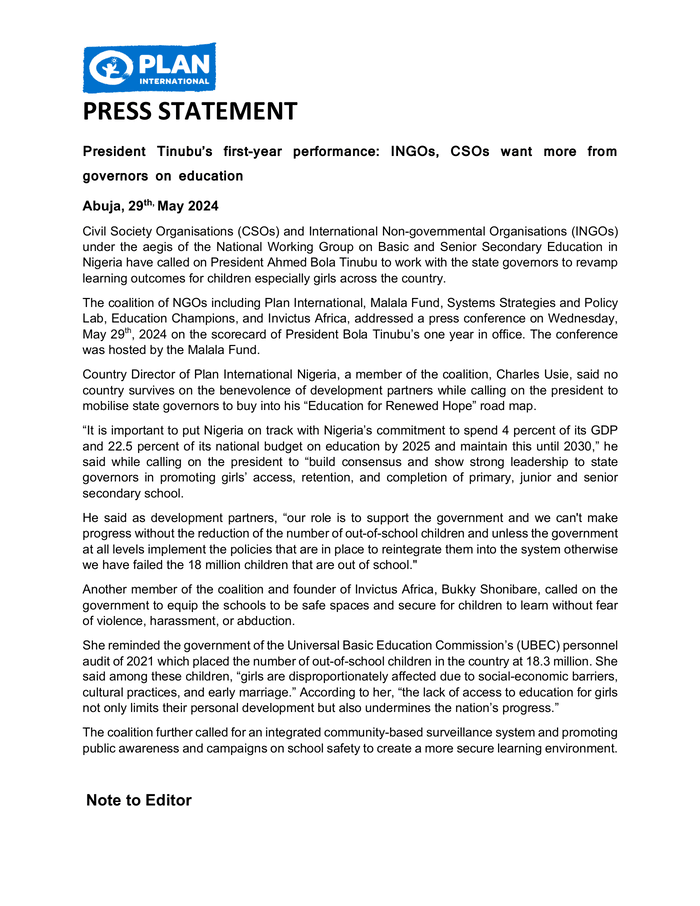Civil Society Organisations (CSOs) and International Non-governmental Organisations (INGOs) under the aegis of the National Working Group on Basic and Senior Secondary Education in Nigeria have called on President Ahmed Bola Tinubu to work with the state governors to revamp learning outcomes for children especially girls across the country.
The coalition of NGOs including Plan International, Malala Fund, Systems Strategies and Policy Lab, Education Champions, and Invictus Africa, addressed a press conference on Wednesday, May 29th, 2024 on the scorecard of President Bola Tinubu’s one year in office. The conference was hosted by the Malala Fund.
Country Director of Plan International Nigeria, a member of the coalition, Charles Usie, said no country survives on the benevolence of development partners while calling on the president to mobilise state governors to buy into his “Education for Renewed Hope” road map.
“It is important to put Nigeria on track with Nigeria’s commitment to spend 4 percent of its GDP and 22.5 percent of its national budget on education by 2025 and maintain this until 2030,” he said while calling on the president to “build consensus and show strong leadership to state governors in promoting girls’ access, retention, and completion of primary, junior and senior secondary school.
He said as development partners, “our role is to support the government and we can’t make progress without the reduction of the number of out-of-school children and unless the government at all levels implement the policies that are in place to reintegrate them into the system otherwise we have failed the 18 million children that are out of school.”
Another member of the coalition and founder of Invictus Africa, Bukky Shonibare, called on the government to equip the schools to be safe spaces and secure for children to learn without fear of violence, harassment, or abduction.
She reminded the government of the Universal Basic Education Commission’s (UBEC) personnel audit of 2021 which placed the number of out-of-school children in the country at 18.3 million. She said among these children, “girls are disproportionately affected due to social-economic barriers, cultural practices, and early marriage.” According to her, “the lack of access to education for girls not only limits their personal development but also undermines the nation’s progress.”
The coalition further called for an integrated community-based surveillance system and promoting public awareness and campaigns on school safety to create a more secure learning environment.
Note to Editor
About Plan International
Plan International is an independent development and humanitarian non-profit organisation that advances children’s rights and equality for girls. We support children’s rights from birth until they reach adulthood, and enable children to prepare for – and respond to – crises and adversity. We believe in the power and potential of every child, but know this is often suppressed by poverty, violence, exclusion and discrimination.
Working together with children, young people, supporters and partners, we strive for a just world, tackling the root causes of the challenges girls and vulnerable children face. We have been building powerful partnerships for children for over 80 years and are now active in more than 70 countries, driving changes in practice and policy at local, national and global levels using our reach, experience and knowledge. Plan International is registered in Nigeria with the Corporate Affairs Commission.
Contact information:
**Yunus Abdulhamid–**Communications Advisor No 49, Anthony Enahoro Street
Utako District, Abuja, Nigeria
Email: Yunus.Abdulhamid@plan-international.org







